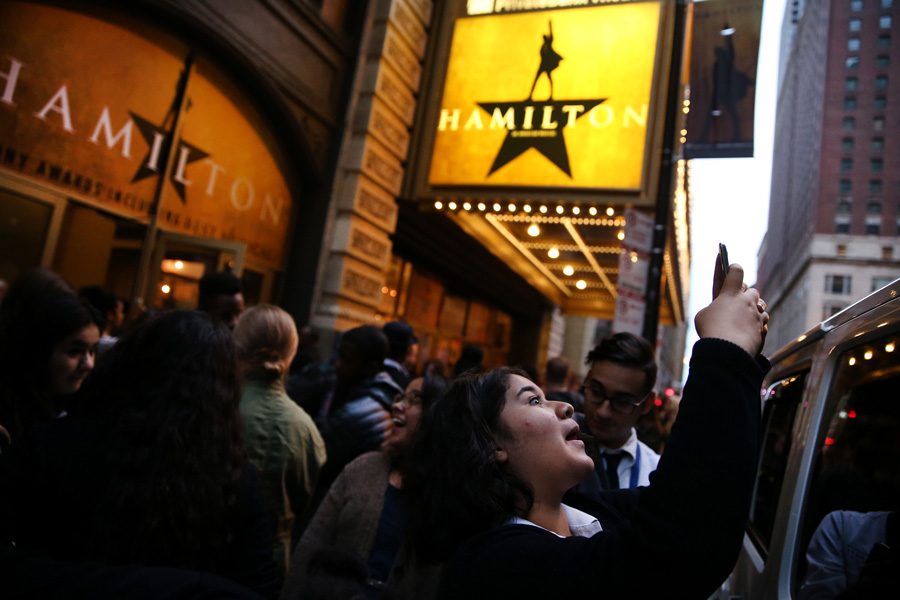Two new course offerings fuel ‘Hamilton’ mania
Chris Sweda/Chicago Tribune/TNS
Diana Andrade, 17, takes a photograph outside the PrivateBank Theatre where Hamilton is making its Chicago premiere on Wednesday, Oct. 19, 2016 in Chicago. Andrade was among a group of students from Chicago Hope Academy who were attending the premiere. Northwestern will offer two courses on Hamilton during Winter Quarter.
November 13, 2016
Two new courses on “Hamilton” offered Winter Quarter will allow Northwestern students to discuss history and law in relation to the Broadway hit musical.
History Profs. Caitlin Fitz and Geraldo Cadava will co-teach “Hamilton’s America,” a course cross-listed in both of the departments. The class will focus on understanding the relationship between history and memory in terms of how people today think about the early United States, Fitz said.
Both Fitz and Cadava said they appreciated the show but emphasized the importance of distinguishing art from history.
“The main thing to realize is that the musical is a work of art,” Fitz said. “It’s not a work of history. … The show oversimplifies important things about Hamilton and his era.”
In particular, she said, the musical downplays Hamilton’s elitism and anti-immigrant policies as a statesman while overplaying his anti-slavery stance.
“But, by the same token, those artistic liberties that the show takes are part of what’s enabled Lin-Manuel Miranda and the cast to translate the ideas, urgency and passion of the past into a language that resonates with us today,” Fitz said.
Whereas Fitz will draw on her work in early U.S. history, she said Cadava will use his background teaching Latina and Latino studies to dissect the show’s contemporary cultural relevance. All of the main actors in the musical are people of color.
“I’m less interested in interrogating (the musical) for its historical accuracy and more interested in trying to figure out how the musical itself has opened up lots of possible historical conversations,” he said.
Such conversations, Cadava said, will explore themes such as empire, immigration, ambition, gender relations, race and slavery.
Legal studies Profs. Joanna Grisinger and Laura Beth Nielsen will co-teach a different Hamilton course next quarter called “Alexander Hamilton: Bullets, Banks and Broadway.”
Grisinger said the course — which is limited to 67 students and includes a free trip to the show in Chicago — will incorporate elements from both the show and Hamilton as a historical figure.
The course will pay special interest to intellectual property questions raised by the show, particularly how Miranda draws on existing rap and Broadway songs. She said students will focus on other key elements of legal history, such as the copyright of “Hamilton” fanfiction, fan art, videos and parodies.
Grisinger said she and Nielsen will incorporate analysis of the Constitution and immigration policy. Several professors, including faculty in the School of Education and Social Policy, the School of Communication and the theater, African American studies, English and political science departments, will guest lecture for much of the quarter, she said.
“This course is a really nice opportunity for students to get to hear how people from all of these different (disciplines) can have very different takes on the same questions,” she said.
There is “tremendous” value in such interdisciplinary thought, with each professor and department bringing something new and unique to the table, Grisinger said.
Fitz said the show is important because it generates critical dialogue.
“Why do we keep coming back to this revolutionary and founding moment?” she said. “I think it’s great that the show has gotten people to ponder these questions and reflect more deeply on our early national past.”
Email: [email protected]
Twitter: @jakeholland97


